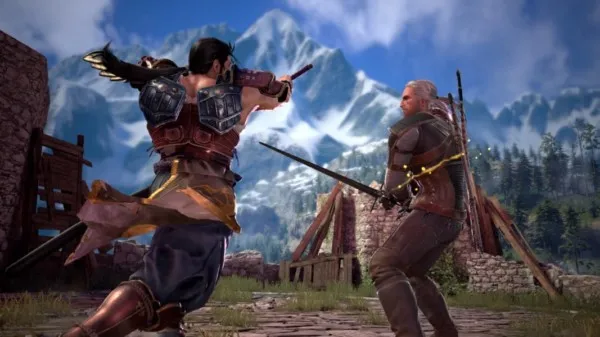Soulcalibur VI Review: Worth The Hype ?
The Review of The Tale Retold

Clash of the forerunners!
Transcending history, and the world. A tale of two swords forever retold. Or until Namco decides to shelve it. What are we discussing? Soulcalibur VI.
Table of Contents
The Tale of Souls redone
Soul Calibur VI picks up a bit after Soul Edge‘s ending, retelling the victory of the ninja and the Greek warrior against the Soul Edge’s owner at the time, Cerevantes. Unlike the first SC, VI attempts to uncover some of the events that were not in the main story, adding in a secret Aval Organization, tasked with ridding the world of outsiders – Soul Edge and Calibur included. It is created by Bandai Namco.
Soul Chronicle keeps things sane with the time. Character happenings are shown on a timeline. Key dates are added to give more purpose since everything is slightly connected. Characters would appear in each other’s stories as overlap. Kilik’s journey would be the focal point, but other stories such as Ivy and Mitsurugi would probably intersect. All voiced in either English or Japanese, depending on options.
What works within the steel of Soulcalibur VI Review
Aesthetically, Soulcalibur VI is beautiful for what it is in terms of a fighter. The stages hold up well next to the Unreal engine. The fighting engine itself does lend itself to its’ older titles than V. Some old and new are taken in. For instance, Reversal Edge – a new mechanic – was added. It’s similar to Tekken 7’s slow-mo hit, but can be triggered at any time and controlled. The reactions to them are more akin to rock-paper-scissors. Gr0h, Geralt, and Azwel are the new faces in this game. Geralt’s a fit into the series more than the other guest characters of the past, even for a Teen game. Potions and finishers of his are intact. The other two are different enough to merit some new blood. The fan favorites are back with new move sets. Critical Edges are back, also.
Libra of Souls attempts to bridge the gap and become the extra story Soul Calibur VI desperately needed to outdo its’ predecessor in an RPG way. A storyline on its’ own with challenges to boot as your personal character wanders, fights, and does everything else. The story’s main characters appear this time, with better dialogue and utilization. Everyone has something to say this time instead of bland and abrupt intros that do not explain their purpose. Access to several weapons from the start was well appreciated. The hit points are kept in this mode. Multiplayer modes such as Network and Battle, are smooth. 3 rounds usually encircle the match. 20 characters were included with several taken out to ensure space for more recent entries. We may not get Rock, but Zaeshemal gets a turn.
Where the faults begin in Souls
It’s hard to fault Soul Calibur VI for much. Personally, for myself, it would have to be a couple of nitpicks. The lack of katas and a decent museum mode was the first. In the first Soulcalibur, for Dreamcast, you at least got to see this. Kilik pulling off wushu techniques without having to be locked into combat was definitely a plus at the time. Compared to what we have now, seemed like a letdown. Museum mode does take a page from Tekken 7, but only in practice. Soul Edge to VI artwork and promo material is offered behind a soul gate. Paying in-game currency unlocks these.
Too bad this doesn’t unlock DLC characters, too. I still loathe the new logo compared to the classic blue and white. 20 characters seem to be another small hindrance compared to the other rosters the game used to sport, but we live in the DLC era.
Some of those changes are forthcoming. The text points in several modes became a chore to read, especially in Libra of Souls mode and character playing lessons. Guess this got out when it was available, putting in more focus on the story. Not many cut scenes made it out this round. Capcom seemed to pull this off better with a more interactive approach. Who remembers moves by heart this deeply if this was going to be taught? Online battles are restricted to Ranked after or in the middle of training to act as a standby. The casual mode does not get that treatment at all, having to prompt the user to exit training and go into that mode directly in Soulcalibur VI.